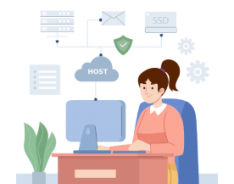HR Solution & HRMS
An HR Solution, often referred to as Human Resources Management System (HRMS), is a comprehensive software platform designed to streamline and optimize various human resource functions within an organization. This technology integrates all HR processes, including recruitment, employee onboarding, payroll management, benefits administration, performance evaluation, and talent management, into a centralized system. HRMS simplifies complex HR tasks, automating routine processes like attendance tracking and leave management while providing a centralized database for employee information. It enhances HR decision-making with data-driven insights and analytics, facilitating workforce planning and strategic management. Additionally, HRMS improves compliance with labor laws and regulations, ensuring that an organization operates within legal boundaries.

HR Solution & HRMS
HRM stands for human resource management. It is the process of managing people within an organization. HRM encompasses all aspects of the employee lifecycle, from recruitment and selection to performance management and termination.
Recruitment and hiring
Effective recruitment and hiring are the foundation of a successful and thriving organization.
Onboarding and training
Seamless onboarding and thorough training empower employees for success from day one.
Performance management
Performance management drives continuous improvement and aligns individuals with organizational goals.
Compensation and benefits
Competitive compensation and robust benefits packages attract and retain top talent.
Employee relations
Positive employee relations foster a harmonious and productive workplace culture.
Health and safety
Prioritizing health and safety safeguards employees and enhances workplace well-being.

Compliance
Compliance ensures adherence to laws and regulations, mitigating risks and upholding ethical standards.

Employee Self-Service
Employee self-service empowers individuals to manage their HR tasks independently, streamlining processes and increasing efficiency.
Strategic HR Planning
HR service and solution providers can offer these services and solutions on a variety of levels, from full-service outsourcing to a la carte consulting. The best provider for your business will depend on your specific needs and budget.
- Reduced costs: Outsourcing HR can save businesses money on salaries, benefits, and training costs.
- Increased efficiency: HR service and solution providers can help businesses to streamline their HR processes and improve efficiency.
- Improved compliance: HR service and solution providers can help businesses to stay compliant with all applicable labor laws and regulations.
- Access to expertise: HR service and solution providers have access to a wealth of expertise and experience that can help businesses to make better HR decisions.
- Free up internal resources: Outsourcing HR can free up internal resources so that businesses can focus on their core business activities.















